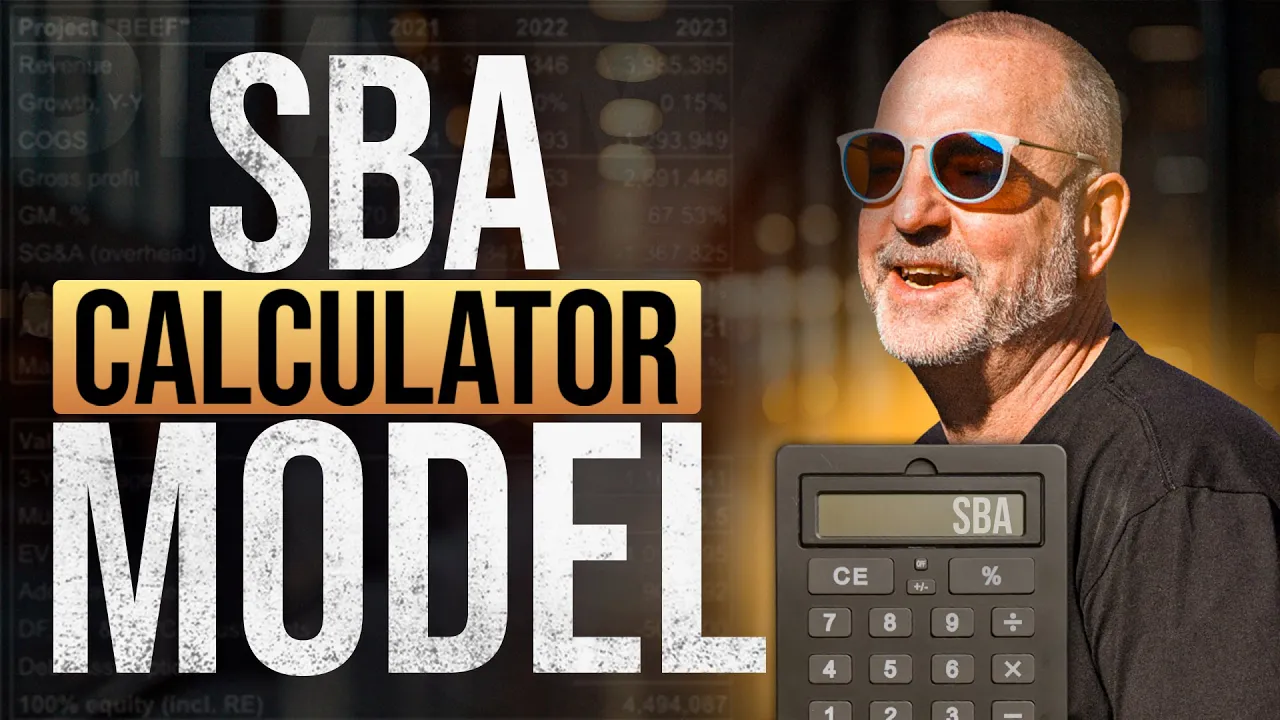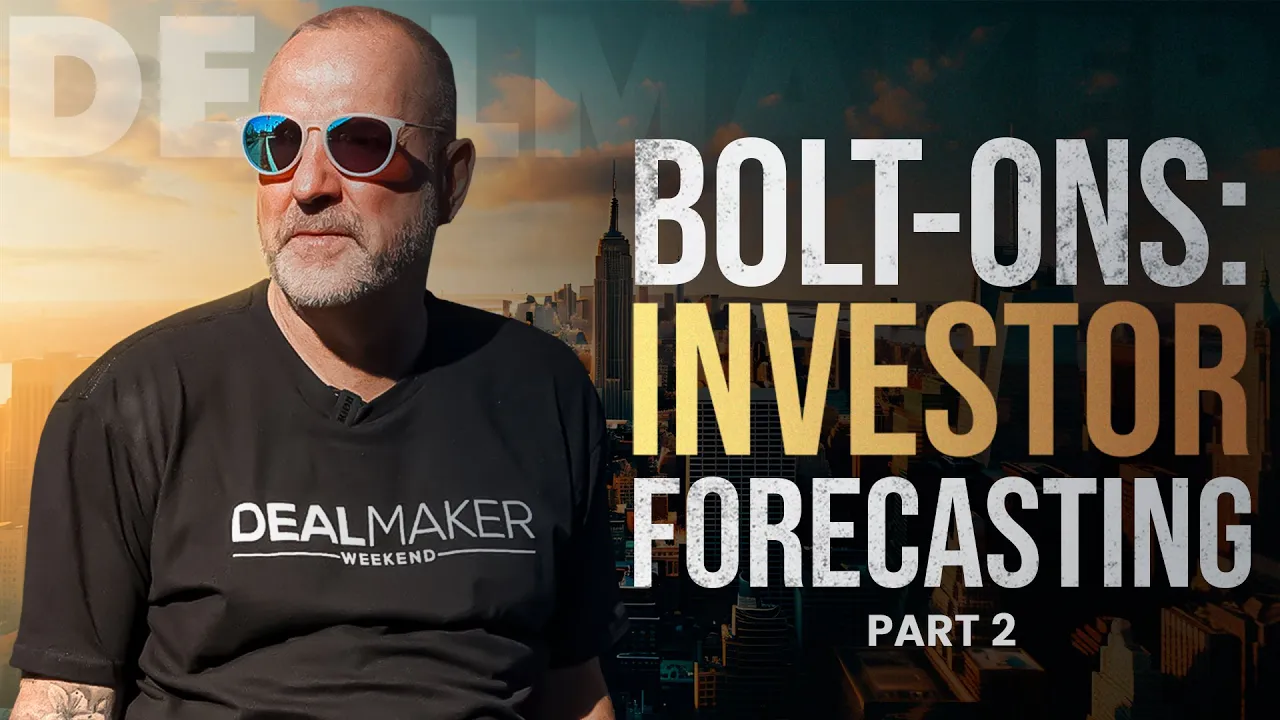Business Acquisition Deal Structures: Seller Financing vs. Annuity Deals
Business Acquisition Deal Structures: Seller Financing vs. Annuity Deals
In this video, Carl Allen explains the distinction between seller financing and annuity deals in business acquisitions. Though structurally similar, seller financing involves paying the seller a set amount over time from the business’s profits. This type of deal places the debt on the balance sheet and includes amortized payments, sometimes with interest. Conversely, an annuity deal is positioned to emphasize seller benefits like higher returns, tax efficiency, and ease of transaction.
Annuity deals offer the seller advantages such as more money over time, reduced tax liabilities, and quicker deal closures, especially compared to the lengthy process of securing an SBA loan. Carl describes annuity deals as ideal for sellers who desire regular income without significant capital gains tax burdens, especially helpful if they seek a swift exit from their business. Additionally, the less rigorous due diligence process in annuity deals reduces seller stress.
Carl also notes that in an annuity deal, the seller receives ongoing income, which may better align with their retirement goals. The tax code allows these payments to be taxed as capital gains, benefiting the seller. He shares a story about the term “annuity deal,” which came from a conversation with a seller who preferred regular income to manage retirement better, leading Carl to position his offer as an “annuity provider.”
Overall, Carl emphasizes that seller financing and annuity deals are identical legally, but reframing the terms can make the offer more appealing to the seller. This approach supports better negotiation outcomes and creates a win-win for both parties involved in the acquisition.
Full Transcript:
Hey, guys. It’s Carl Allen. Got a really cool video that I wanna do for you today. I pulled the whiteboard out of my office in my Florida home into, like, the main lounge area because, better lighting, and I wanted to do this video for you. So I wanna talk about the difference between seller financing and an annuity deal. K?
So in terms of a deal structure, they’re actually exactly the same. So seller financing on a deal is where you’re paying the seller future payments from the cash flow that the business is generating once you’re the owner. This is very different to an earn out. I’ll do a separate video on that.
The seller financing is a contracted payment. The the debts sits on the balance sheet, and then you amortize the payments over a period of time. Sometimes you have interest payments in there. Sometimes you don’t.
So let’s say you were doing a deal. Let’s say you agreed a deal with a seller, that that the business is doing four hundred thousand dollars per year of profit, which is called EBITDA. And let’s say you agreed to buy that business for a a a four times multiple, so one point six million dollars at ten years, which is a hundred and sixty thousand dollars per year. So every year for ten years, the seller’s getting a hundred and sixty thousand dollars a year, and you’re banking the rest.
Right? So you’re banking the difference between the four hundred and the one sixty, which is two hundred and forty thousand dollars a year or twenty thousand dollars a month. Right? So that’s what you’re making out of the deal.
Right? So to position this type of deal, we turn it into something called an annuity deal. So it’s exactly the same structure, exactly the same terms, exactly the same legals, but we focus on the major benefits of the annuity deal to the selling business owner. So what are they?
So number one, they get more money.
So depending on what sector that business was in, we could determine what the value, what the multiple would be. So, normally, a four hundred thousand dollar a year EBITDA business might sell for two to two and a half x EBITDA as a multiple. Right? So the fact that you’re paying four times instead of, say, two times, you’re actually paying the seller double the amount of money for the business, albeit over an extended period of time.
And it’s it’s just like going and and leasing a car versus buying a car. Right? So if you wanted to buy a Tesla, you could rock up to dealership. Let’s say you wanted to buy one of those new Tesla wise, and let’s say they’re fifty thousand dollars.
If you were to finance that over, say, six or seven years, you’d probably end up paying sixty, seventy, eighty thousand dollars depending on what the terms are. Same with a house. If you buy a house for cash, you’ll you’ll pay what the house is worth. If you mortgage that house over ten, twenty, thirty years, you’ll pay a lot more for the house.
Right? So it’s exactly the same in annuity deal. We’re basically offering the same sort of terms that you would get when you’re financing the purchase of of whatever it is, right, whether it’s a car, a house, or anything like that. So benefit number one is the seller’s gonna get more money.
Right? Benefit number two, the seller is gonna pay less tax. Right? What does that mean?
So if you did that deal even at, even at a two times multiple eight hundred thousand, let’s say two and a half million dollar transaction, the seller’s probably gonna pay half of that intact. Right? So they’re gonna net five hundred thousand dollars from the proceeds and all have broker fees, all have closing costs. They might end up with only three hundred and fifty thousand dollars left to go and invest.
And if the seller wants retirement and they want income versus capital gain, that might not be enough money for them to live the life that they’ve become accustomed to. Right? So by paying them a monthly payment, so what they do is they’re only taxed when they receive the money. So the IRS changed the tax code.
It’s code two thirty seven. They changed it a few years ago so that the seller only pays the tax when they receive the money from you. Right? And it’s all it’s also taxed as capital gain, yet it’s actually income to them in their pockets and in the bank accounts.
Number three, probably one of the biggest benefits, it’s a lot faster. Right? So if you were doing the original deal, let’s say you were paying a million dollars for that business, two and a half times the four hundred thousand dollars of EBITDA, then let’s say you decided to go to the SBA. You went to a bank like ReadyCap or Live Oak or or Chase or whoever it was, and you decided to do that deal through the SBA seven a loan program.
Right?
Yet, you’d have to put some equity down and all those different things, but the problem is that deal might take four months. It might take five months. It takes a long time to do an SBA loan. Right?
Because they’ve relaxed the rules. A lot of people are utilizing that that that deal structure, that funding stream right now. So, the SBA hasn’t quite caught up with the processing power it needs to get all these loans through. Right?
So, an SBA deal could take four months. An annuity deal can take four days, right, or one to two weeks maximum. Right? So it’s a much faster deal.
So if you’ve got a seller with a high degree of distressed seller psychology and they wanna come out of the business super quickly and they don’t wanna wait three, four, five months for the capital to land, they’re they’re gonna lose a lot of it intact. Right? So a faster deal is one of the really, really cool benefits.
Point number four, it’s less stressful.
What do I mean by that? So if you do an SBA deal, the bank and the SBA are gonna be all over the seller for data and information and business plans and tax returns and legal structures and all those different things. They’re gonna do an awful lot of due diligence. The more money that goes into a deal from an outside party, the more due diligence that the deal actually needs.
So with an annuity deal, you can do very, very, very light touch due diligence. Just make sure they’ve paid their tax returns, and then just have your returnee double check couple of hours that the business is safe to buy. There’s no big pending litigation or there’s nothing seriously untoward with with the legal documents. Right?
So it can be a lot less stressful. And then number five, we touched on it before. It’s really income versus capital gain. Right?
So the money is not taxed as income. It’s taxed as capital gain, so it’s lower tax, but the seller treats it as income because they’re getting that regular monthly payment through the seller financing, which because they’re getting a lot more of it, it means they can live and have a much more enjoyable retirement. So just to summarize, seller financing deals and annuity deals are exactly the same.
The annuity deal gives the seller more money. They pay less tax. It’s a much faster deal to close. It’s a lot less stressful because it’s a lot lighter touch due diligence, and you can provide income to the seller versus capital gain, although it’s still taxed as a capital gain.
Now let me tell you a quick story about where the word annuity deal came from. So I was on a phone call with the seller a couple of years ago, and we were going through the numbers, and he wanted, like, a six times multiple for his business. And it was really worth a three times multiple. Right?
As you know, there are lots of sources that publish the multiples for what businesses typically sell on average in any industry. So his business was really worth a three x, but he wanted a six x. And I asked him the question. I said, hey.
Your business must absolutely be best in class for you to want a six times multiple.
Tell me about that. He said, what are you talking about? Multiples. Like, a CPA is not valued by business. It’s been valued by my wealth manager.
I said, really?
Wealth managers are not trained to value business acquisitions. Right? They’re trained to manage your money and provide you with a return. He said, well, I know that, but I told my wealth manager that I was gonna retire.
I was gonna sell my business, and this is how much money I needed, twelve thousand dollars a month, I think it was, to retire comfortably for the rest of my life. So all the wealth manager did is calculate what would the size of the money market product that he would have to buy that would churn out the twelve thousand dollars a month. And then he reversed engineered that by adding back tax and fees and all those different things. And that created this massive valuation, which when you divided that by the current profitability of the business, gave it a big spiky, multiple.
So I said, well, hey. Now I understand what you’re doing. Why don’t I just become your annuity provider? Why don’t I just pay you twelve thousand dollars a month out of the business?
And he said, you would do that?
You would do that for me? I said, absolutely. Yeah. Of course, I will do that.
No problem at all. And because the surplus cash in the deal, we can use that to pay the closing costs. So it’s not gonna cost you any money to do this deal, and then you sell. We can do this deal in three or four days, and then you can get that regular monthly payment, for ten years.
He said, wow. That’s amazing. And then he paused, and he said, well, so the only thing I gotta figure out then is is my money safer in my own business, or is my money safer in the stock market where I can’t control it? And he said, I’ll tell you what I’ll do.
Give me ten percent retained ownership of the business so I can stick around and still have access to bank accounts and all those different things, and I will do that deal. Right? So that’s why I call it an annuity deal because it came from a seller that wanted the closing proceeds to buy an annuity product in the market to pay him a regular income for a ten or year period or more. So that’s where it’s came from.
That’s the difference between seller financing and annuity. Exactly the same transactionally. It’s just how you position it and how you sell the benefits of that deal to the business owner. Hope you found that useful.
Don’t forget to hit like and subscribe to this video so I can give you all of my videos in real time. If there’s any question that you’re needing an answer for, definitely hit me up in the chat, type that question in, my team will get back to me, and I’ll record a video just for you. So I will see you soon, guys. Until then, bye for now.




